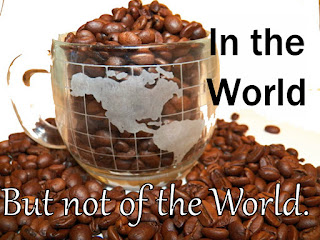GRATITUDE IS A VERB
SCRIPTURE I
Timothy 1:12-17
Luke
17:11-19
 In the later years of my life, my dad showed
me what an “attitude of gratitude" looked like. He greeted each day with
joyful expectation as if it had delightful wonders in store for him,
and he was going to relish every minute of it. He was humbly and
sincerely grateful for everything he had and anything anyone did for
him. He was no saint, but he knew how to be grateful.
In the later years of my life, my dad showed
me what an “attitude of gratitude" looked like. He greeted each day with
joyful expectation as if it had delightful wonders in store for him,
and he was going to relish every minute of it. He was humbly and
sincerely grateful for everything he had and anything anyone did for
him. He was no saint, but he knew how to be grateful.
Sometimes,
though, to make a difference in the world, it takes more than
attitude; it requires action as well, as we turn gratitude into a
verb.
One
of the opening scenes of the movie, “Pay It Forward” begins with
a dark and rainy night. A young crime reporter is cruising the
streets, listening to a police scanner. He perks up when he hears
that a bungled burglary in an upscale suburban neighborhood has
turned into a hostage situation.
Arriving
at the scene, he leaves his car to see if he can get information from
the police crouching behind their vehicles. He needs this story. What
he doesn't need are the robbers crashing through the garage door in
the homeowners' car, backwards at full speed into his car. It is
totaled, and the reporter stands in shock as the robbers and the
police speed away.
Out
of the rainy night, he is approached by a well dressed stranger out
walking his great Dane. “Have a little car trouble. I can help.”
He tosses the reporter his car keys, “It's the Jaguar over there.”
The
reporter can't believe it. Surely the man wants something in return.
The man answers the reporters doubts with, “I've had good luck
lately, I don't need it. Let's just call this an act of generosity
between two strangers.”
What
led to this unconditional, unexpected and extravagant act of
generosity was a chain of events that began three months earlier as
an assignment in a seventh grade social study class. Trevor and his
other classmates were told to come up with an idea of how to make the
world a better place.
Trevor's
idea was to do favors for three people, something that wasn't easy
for him to do. The people he did favors for weren't expected to pay
him back. Rather, in response to his generous act, they were to each
to do favors for three people, with the same stipulations. It had be
something that was hard for them to do without expecting the people
to pay them back, but the ones who received the favors were supposed
to pay it forward to three other people.
Generosity
begat gratitude that begat generosity …
Initially,
Trevor wasn't very successful as some people didn't bother to pay
forward Trevor's favors. It reminds me of the story of Jesus and the
ten lepers.
Ten
lepers approached Jesus and asked to be healed. Ten lepers were
healed, but only one said, “Thank you,” before going to the local
priest to be declared healed and ready to rejoin human society. It
makes me wonder why only one when ten were healed.
Maybe
they felt entitled. Jesus did miracles for others, Jesus would of
course do a miracle for them. They deserved it for all the suffering
they had endured. They just took it for granted they would be
healed. There's some ego and arrogance in the attitude of
entitlement. Gratitude begins with humility.
The
one who returned was a Samaritan, despised by Jews. Like Paul who
knew that he didn't deserve God's mercy, the Samaritan didn't expect
the miracle of healing from a Jewish teacher, like Jesus. Imagine
the depth of his gratitude that had to be expressed in action –
kneeling at Jesus feet, worshiping him and giving thanks.
Or
maybe the nine were too busy. We know what that is like – so much
to do with never enough time, and well, we can't remember to do all
of them.
We
often get caught up in our culture's addiction to busyness, don't we?
We try to cram every minute full of “doing,” Some of the things
we fill our time with are like junk food full of empty calories. In
the long run, these activities don't really help us grow as healthy,
thriving human beings.
Like
any addiction, busyness becomes compulsive behavior. Moderation goes
out the window leaving no room in our lives for life-giving
practices, including being in relationship with God and living out
gratitude in our lives.
So,
here's three things to keep in mind:
- Everyday, count your blessings, every day, not because we deserve any of them but because God unconditionally loves us and wants good things for us. That's what Paul is doing in his letter to Timothy. Thriving Christians don't let themselves become so busy that they forget to do this.
- Everyday, glorify God. Give thanks. Wake up in the morning looking forward to another day of life, another day of living and discovering God's love in action around us. And then humbly and sincerely be thankful for every blessing we have received from God and every act of kindness that comes our way. An attitude of gratitude one of our responses to God's generosity, and an important part of our day.
- Everyday, pay it forward. In John 15:8, Jesus says to his disciples, including us, that “My Father is glorified by this, that you bear much fruit and become my disciples.” (NRSV)
Bearing
fruit is part of thriving as Christians and as a congregation.
Remember, thriving is being firmly rooted in our relationship to God
through Christ as we reach out like branches on a tree, offering to
others in this world service (fruit) of compassion, love, justice and
hospitality. Doing meaningful things with our time like this is
like eating a healthy diet.
In
the movie, as Trevor's idea began to spread, the man who gave the
young reporter his expensive sports car was the recipient of a
favor, that changed his life. When we respond to God's love by
paying our gratitude forward, it affects people in transformational
ways as they experience the love of Christ through us.
Gratitude
is our response to God's love, freely and unconditionally given and
demonstrated in the life, death and resurrection of Jesus Christ. An
attitude of gratitude is important, but our call as disciples of
Jesus Christ asks us to do more, to live gratitude as a verb.
How
will you live gratitude as a verb in the coming week? How will we
glorify God, and, in our own small way, make the world a better place
through Christ?



Comments
Post a Comment